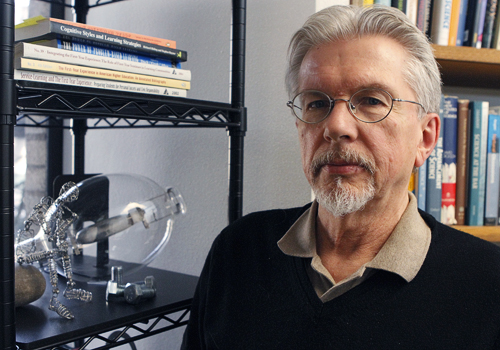Michael Flower, a professor of interdisciplinary science studies, has been teaching some form of the class “Science: Power-Knowledge” for much of his career. Before coming to Portland State, he taught a less-developed version of the class at Lewis & Clark College, which he has since fine-tuned at PSU.
Class profile: ‘Science: Power-Knowledge’

Michael Flower, a professor of interdisciplinary science studies, has been teaching some form of the class “Science: Power-Knowledge” for much of his career.
Before coming to Portland State, he taught a less-developed version of the class at Lewis & Clark College, which he has since fine-tuned at PSU.
The class looks at what Flower called politicoscientific controversies.
“The point is to try to think about the sciences, especially contemporary sciences, in an interesting, sophisticated way, politically,” he said.
Flower added that “the course really depends upon rethinking what science is, what politics consist of, what the role of the public is in respect to the work of the experts.”
Over the years, Flower has created a website to support the class. The website has many resources for students, including a syllabus, descriptions on what the course is about and will cover, how to complete the projects done throughout the class, and examples of assignments from previous years.
The website is very interactive, and Flower says he has a good time adding new elements to improve discussion and understanding for students.
The course is a University Studies junior cluster course, and fulfills two different clusters: Science in the Liberal Arts and Freedom, and Privacy and Technology.
Students who take the course come from a wide variety of disciplines, so Flower makes sure to teach the course with that in mind, avoiding straight, hard science.
Though trained as a molecular developmental biologist, Flower said he has been looking at the science from very interdisciplinary ways since the mid-’80s.
“When you look closely—at the mix of science, politics, economics, morality and all that—it’s a very entangled situation,” he said. “Science travels along with many other things, even from the very get-go.”
The class is based on the work of Bruno Latour, a world-famous anthropologist. “[Latour] has developed a very interesting approach to the sciences that I use, and I’ve known Bruno since before his work became famous. We have been colleagues for many years,” Flower said.
Flower employs a discussion-based method of teaching. Readings from Latour or other sources are assigned before a discussion is held in class. Flower requires three responses to be turned in on the readings, in addition to the discussions in class.
He gives no examinations, but his class is project-oriented, leading up to one final project.
This project is to explore a politicoscientific controversy, look at arguments being made on both sides and analyze what is being questioned.
Flower said that some examples of these controversies would be fracking, genetically modified foods or stem cells. “Something where the science is uncertain, or it’s provoked,” he said.






